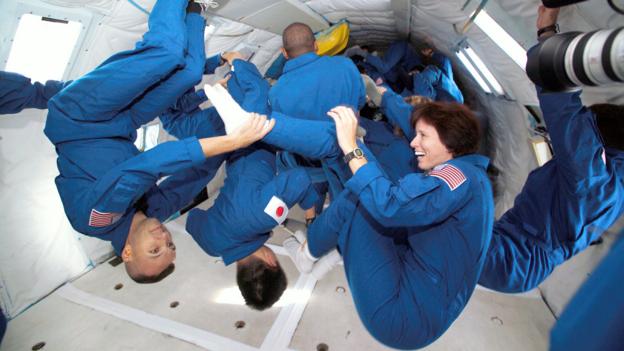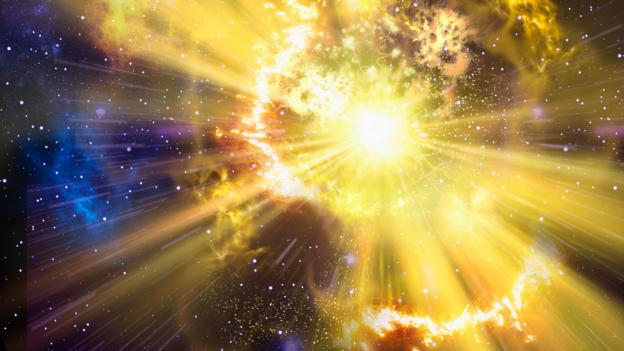Gravity, in the form of gravitational waves, is on a lot of people's minds at the moment. We have all experienced the force of gravity. It is what happens to you when you jump up into the air. Disappointingly for anyone with ambitions to be Supergirl or Superman, we tend to fall right back down to the ground. But what if we could switch gravity off?
Physics is adamant that this could never actually happen. But that has not stopped people exploring the idea. Here, based on the collective wisdom of several experts, is the best guess at what would happen to you if gravity suddenly vanished.
Jay Buckey, a physician and one-time NASA astronaut, explored how the absence of gravity affects the human body in a short Ted-Ed lecture. Wounds take longer to heal and the immune system loses its strength
Buckey says that our bodies are adapted to an Earth-like gravitational environment. If we spend time living where gravity is different, such as on board a space station, our bodies change.
It is now an established fact that astronauts lose bone mass and muscle strength during stints in space, and their sense of balance changes.
An absence of gravity brings other problems. For reasons not entirely clear, our red blood cell count falls, bringing on a form of "space anaemia". Wounds take longer to heal and the immune system loses its strength. Even sleep is disturbed if gravity is weak or absent.
That is just what happens after a short visit to space. "What if you were to grow up without gravity?" Buckey asks. "What about the systems that depend on gravity like your muscles, or your balance system, or your heart and blood vessels?"
There is good reason to believe the human body would develop differently.
Buckey points to an experiment in which a cat grew up with one eye permanently hidden behind an eyepatch. The cat was rendered blind in the eye as a result. The circuitry that would have connected it to the brain's vision processing regions failed to develop, because the eye was not processing any visual information: a very literal example of the old phrase "use it or lose it".
Earth's atmosphere and its oceans, rivers and lakes would be one of the first things to drift away into space. It seems likely that the rest of our bodies would respond similarly. If gravity was not around for our hearts, muscles and bones to respond to, our organs would almost certainly develop in different ways. That said, if gravity did get switched off we would have more pressing things to worry about than the long-term effects on human development.
Scientists have explored the immediate physical consequences of losing gravity. The first problem is that Earth is rotating at high speed, rather like the way a weight on a string rotates if you spin it around your head. Switching off' gravity is analogous to letting go of the string. Things not attached to the Earth in any other way would fly off into space in a straight line that would take them away from the surface of the Earth.
Staying inside offers a measure of protection. Anyone unfortunate enough to be outside at the time would quickly be lost. People inside buildings would be safer, because most buildings are so firmly rooted to the ground that they would stay put even without gravity – at least for a while. Anything else not nailed down would also float off. Earth's atmosphere and its oceans, rivers and lakes would be one of the first things to drift away into space. Eventually there would be no clumps of matter, like stars or planets, anywhere in the Universe. Oh, and of course we'd all die.
A lack of gravity would eventually take its toll on our very planet. Earth itself would most likely break apart into chunks and float off into space.
A similar fate would befall the Sun. Without the force of gravity to hold it together, the intense pressures at its core would cause it to burst open in a titanic explosion. The same thing would happen to all the other stars in the Universe. However, because they are so far away, it would be years before the light from their death throes reached you.
Eventually there would be no clumps of matter, like stars or planets, anywhere in the Universe. There would just be a diffuse soup of atoms and molecules, drifting around not doing anything much.
This scenario – which just to repeat, could never happen – illustrates just how fundamental gravity is to the workings of the Universe. Without it, nothing interesting like planets could ever exist. Oh, and of course we'd all die.
Gravity is one of four fundamental forces that govern our Universe. The other three are just as crucial. Without electromagnetism and the strong and weak nuclear forces, atoms themselves would fall apart. But gravity is the only one that is truly a household name, which is perhaps why we are so fascinated by ideas like antigravity – and why the discovery of gravitational waves is so exciting, even if it never touches any of our lives directly.... we know it is making the universe work and holds it all together.




Aunt Jeannie , this is a very good question , we had so many ideas what would happen . We went to questions and answers on Yahoo for some answers we like these better . Tell us what you think ?
ReplyDeleteYou sent us this post just in time , our NASA teacher asked all of the students to come us with a topic and this one is a winner .
Would we all be thrown into space since gravity is the only thing keeping us down?
It is an amazing question, what if, gravity just stopped moving. Gravity is a mystery in many ways. In one hand it is believed to be a single force or particle where the motion it creates is constantly going down or inwards, but on the other hand, gravity only exists when mass exists. Gravity technically is a curve in space time created by mass so in order for gravity to stop mass would need to not exist to do so. This in turn would create a void where some believe is what existed before the big bang.
if gravity stopped, Earth won't be able to go round the sun anymore, so earth will lose track, instead of having a eliptic travell surrounding the sun, earth would began moving in a straight line away from the sun, so every minute the earth will be farther away from the sun, after a while everything will get colder until everything gets frozen. how long ? well i'm not sure it could be matter of a couple of weeks perhaps a month or two, that if earth is not destroyed by another object floating around. we would experience a very cold winter, cause of death: Hypothermia.
Mr Harris is going to like this one . Thank you so much we sends you love and hope you are getting much better get flowers and chocolates for Valentine .
Daddy told mama he was getting her chocolates and she no because she had to watch her figure , daddy said that is all right baby , he was watching her figure . Thank you so much from all of us and Man say what are you doing . we love you .
Wrote by Jonny and Chris
Boy, you guys are smart.
ReplyDeleteEverything you said was very logical and good sound science. Gravity is the weakest of the four forces in the universe but it is the most important. It's the glue that holds everything together.
When I started with this question, I just considered the earth losing gravity. I figured the atmosphere would go first and we would all suffocate....which is too bad because we wouldn't be able to see all the neat stuff that happened next. Then all the water in the world would be sucked into space, oceans, rivers and since humans are made of about 60 to 65% water, all the water in our bodies would be sucked out as well and we would be a planet of dried up little raisin people. Then all the human raisins would be pulled into space and everything not attached to the planet. The other interesting fact is that there is a lot of internal pressure at the core of the earth. And if the gravitational pressure on the mantle or outside of the earth ( which equalizes the pressure) was taken away, the inside pressure would start to blow stuff out, like huge volcanic eruptions and earthquakes as the plates started to move apart. Finally, I think the planet would explode into a billion pieces which would continue to orbit the sun.
If the sun lost it's gravity, it would shoot all the planets in our solar system out into space in every direction. And as you said in straight lines until they collided with something. More mass means more gravity, as a general rule. That doesn't apply to black holes of course. The sun would be a massive explosion. If the whole universe lost all gravity and all the stars and planets exploded, I think it would end up as a big plate of soup.
I had a lot of fun with this question and I am so happy that it came in handy for you guys. I would love to hear what your NASA teacher has to say about it. I bet we have missed a few interesting things that he will know.
Love to you all
Talk to you soon
Aunt Jeannie